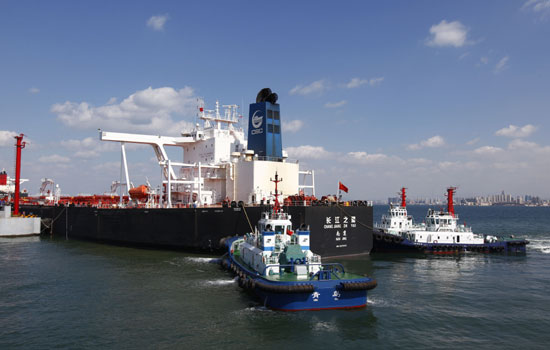
China's sluggish shipping industry took its toll on many port enterprises in the third quarter of 2012 and those businesses may face even harder times in the rest of the year, according to a recent report.
|
 |
|
A container vessel in Qingdao, Shandong province. The nine biggest Chinese shipping enterprises reported an aggregate loss of nearly 8 billion yuan in the first half of the year, according to a Securities Daily report. [Photo/China Daily] |
The Shanghai International Shipping Institute reported its Chinese shipping industry prosperity index decreased by 16.37 points from the second quarter to the third quarter, dropping to 78.17 points. That suggested the industry is entering a less-prosperous period, the report said.
A score above 100 on the index indicates prosperous times for the industry.
The report also said the Shanghai International Shipping Institute's shipping confidence index slumped by 19.37 points from the second quarter to the third quarter, falling to 44.05 points, and said that more than 63 percent of the shipping businesses that were polled in the survey were pessimistic about the industry's prospects.
The prospects of China's shipping industry have become dimmer as less electrical power has been generated and fewer shipments have been handled by ports in the past several months, the report said.
From July to September, the institute's prosperity index for Chinese port enterprises dropped to 97.42 points, a decline of 20.72 points.
That brought it below 100 for the first time since the 2008-09 global financial crisis, suggesting that Chinese port companies are operating in more difficult conditions.
In the first half of the year, listed Chinese port companies, excluding Wuhu Port Storage & Transportation Co Ltd, posted a combined net profit of 6.41 billion yuan ($1 billion), edging down 0.5 percent year-on-year as a result of declining profit margins, as well as higher financial expenses, taxes and labor, fuel and lighting costs, according to a report by the analyst Li Zhou at Qilu Securities Co Ltd.
The nine biggest Chinese shipping enterprises, including China COSCO Holdings Co Ltd and China Shipping Container Lines Co Ltd, reported an aggregate loss of nearly 8 billion yuan in the first half of the year, according to a report by the Securities Daily newspaper, and, according to other media reports, Wei Jiafu, chairman of COSCO Group, China's biggest ship operator, has asked for government aid on several occasions.
In a survey conducted by the Shanghai International Shipping Institute, 28 percent of shipping corporations said the government should take steps to prevent listed shipping companies that have posted losses in consecutive years from being delisted. But 65 percent of those polled said they think State-owned companies should not be allowed to obtain government support after reporting large losses.
The report advised Chinese shipping companies to make internal reforms as the world shipping industry continues to struggle.
It called on them, for instance, to strengthen their ability to make profits and reduce their expenses by postponing the delivery of new vessels and combining relatively inefficient shipping routes.
The report noted that some shipping enterprises still managed to report profits in the first half of 2012. Among them were the Hong Kong-based Orient Overseas Container Line Ltd, which had $116.7 million in earnings in the first half, and the Copenhagen-based AP Moller-Maersk Group, which had $2.1 billion.
The Ministry of Transport said on its official website on Tuesday that it will help privately owned shipping and port enterprises become stronger competitors overseas by offering them favorable tax, financing and insurance policies.
Meanwhile, the ministry said it encourages private shipping and port companies to cooperate with State-owned companies.
wang_ying@chinadaily.com.cn
 Use of RMB as settlement currency rise
Use of RMB as settlement currency rise Daimler starts new $2.4b plant
Daimler starts new $2.4b plant Overdue loans pile pressure on lenders
Overdue loans pile pressure on lenders